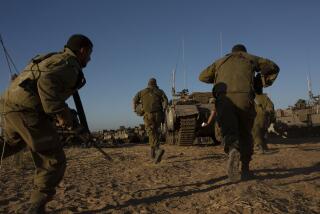COLUMN LEFT : Rolodex Army Wages a Nintendo War : TV’s deskbound generals tune out on the crucial issues--morality, economics, values.
- Share via
History will record that the first phase of Desert Storm lasted exactly a week. For seven days, a blur of meaningless press briefings, video-game images and bleary-eyed correspondents gave us the illusion of war, and the illusion of news.
The consonance between what we saw on TV and what the Pentagon censors wanted us to see was so complete that it was tempting to imagine a new award for valor in wartime. One that would combine the highest honors of the military and the press: a Purple Pulitzer, perhaps, to CNN’s Charles Jaco, for his frantic guessing games in the darkness of Saudi Arabia, a Sound Bite Cross to Capt. Steve Tate, the first pilot to shoot down a “hostile.”
“The belief in the possibility of a short, decisive war appears to be one of the most ancient and dangerous of human illusions,” the Anglo-Irish essayist Robert Lynd once wrote, and the second phase of Desert Storm began when that illusion started to crack. On Jan. 23, Washington brought out its top guns--Gen. Colin L. Powell and Defense Secretary Dick Cheney--to quiet a growing rumble of discontent at Pentagon news-management, summed up that morning in a Washington Post editorial entitled “The Nintendo Issue.”
But it turned out that the media had no real interest in broadening their inquiry. What irked them was the lack of operational data. Just how do we conduct bomb-damage assessment, general? How many Scuds do they have left? And under the demand for more maps, better videos, sharper pictures, the subtext: Please calm our fears about how quickly and one-sidedly we are going to win this one.
War is the most shattering activity in which a society can engage. Nothing else poses such profound questions of morality and mortality. Yet those who mediate our access to this war--the generals and the TV producers--prefer to channel our thoughts into the most trivial metaphors in our culture: the football field, the video game.
To fill in the gaps left by the Pentagon, every network producer has a Rolodex full of military analysts and retired officers, many of them highly paid shills for the arms industry. CNN is perhaps the worst culprit here. In one egregious case, it turned for an opinion to Richard V. Secord, retired Air Force major general. You may recall Secord from the Iran-Contra affair, but CNN presented him only as a retired officer with years of experience in the Middle East. Much of that time, in fact, was spent fashioning the strategic relationship between the United States and Saudi Arabia.
Are there any economists in those Rolodexes who might figure out how much Desert Storm will cost? Or a feminist, perhaps, to discuss our national love affair with expensive metal machines called Tomcats and Tomahawks and Wild Weasels, whose only function is to kill and destroy? How about scouring the files for a bishop or two, someone who can quote Reinhold Niebuhr on war as well as Karl von Clausewitz?
Any of these commentators might help decode the obsession with technology and arrive at the larger moral question that it obscures--a question posed crudely by Saddam Hussein last July in his encounter with U.S. Ambassador April C. Glaspie. Does the United States have the stomach for 10,000 deaths in battle? he asked.
For George Bush, the lesson of Vietnam--where the United States killed 20 Vietnamese for every American fatality--is that this time our armed forces will not fight “with one hand tied behind their backs.” The unspoken corollary seems to be that we expect our enemies to fight with both hands tied behind theirs. The Pentagon hops with indignation that Saddam Hussein’s forces will not come out into the open so that our bombers can annihilate them without loss of American life.
In John Le Carre’s novel, “The Honorable Schoolboy,” the British spy Jerry Westerby finds himself at a remote CIA air base in northern Thailand on the day of the fall of Saigon. “The windows overlooking the airfield were smoked and double-glazed. On the runway, aircraft landed and took off without making a sound. This is how they tried to win, Jerry thought: from inside soundproof rooms, through smoked glass, using machines at arm’s length. This is how they lost.”
This time around, the glass is darker, the machines more advanced, the arm longer. In the end, even after a ground war fought on Hussein’s terms, the United States may well “win”--whatever victory means, whatever the moral and political cost. But those are questions the networks, for all their apparent frustration with the Nintendo war, are as remote as ever from asking.
More to Read
The biggest entertainment stories
Get our big stories about Hollywood, film, television, music, arts, culture and more right in your inbox as soon as they publish.
You may occasionally receive promotional content from the Los Angeles Times.










